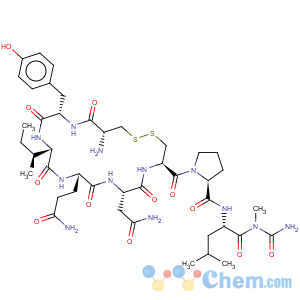Oxytocin
-
- Product NameOxytocin
- CAS No.50-56-6
- Purity99%
- Min Quantity1Kilograms
- Price1~10

 View Contact Detail
View Contact Detail
-
 Molecular Structure
Molecular Structure
Detailed Description
Oxytocin is a mammalian hormone that acts primarily as a neuromodulator in the brain. Oxytocin is best known for its roles in sexual reproduction, in particular during and after childbirth. It is released in large amounts after distension of the cervix and uterus during labor, facilitating birth, and after stimulation of the nipples, facilitating breastfeeding. The word oxytocin was derived from the Greek word", meaning quick birth. The oxytocin peptide is synthesized as an inactive precursor protein from the OXT gene.Oxytocin is a peptide of nine amino acids (a nonapeptide). Its systematic name is cysteine-tyrosine-isoleucine-glutamine-asparagine-cysteine-proline-leucine-glycine-amine (cys, tyr, ile,gln,asn,cys, pro, leu, gly - NH2, or CYIQNCPLG-NH2). The cysteine residues form a disulfide bond. Oxytocin has a molecular mass of 1007 daltons. One international unit (IU) of oxytocin is the equivalent of about 2 micrograms of pure peptide. The trust-inducing property of oxytocin might help those who suffer from social anxieties and mood disorders, but with the potential for abuse with confidence tricks and military applications.
Web: www.rawsgear.com
Web: www.rawsgearpharma.com
Email: gear@quality-steroid.com
Skype: +8615711952876
Whatsapp +8615711952876